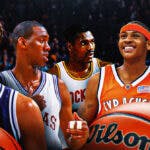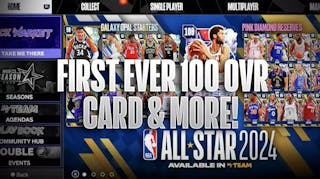The trio of Michael Jordan, LeBron James, and Kobe Bryant have already cemented themselves in the game's pinnacle of all-time greats. The immeasurable impact that all three legends had has greatly contributed to the advancement of the game and effectuated the next generation of hoopers throughout the years. NBA Goat conversations can't be had without them.
In an alternate universe where all three cagers didn't exist, the Greatest of All Time or NBA GOAT status could've circled around legendary big man Kareem Abdul-Jabbar instead. He became the epitome of exemplary leadership and patented the most unguardable shot that the game has ever seen.
Before making a name for himself in basketball's most competitive stage, the man who is formerly known as Lew Alcindor already ruled the amateur ranks after winning 71 consecutive basketball games for his Power Memorial Academy high school team in Manhattan, New York City. His solid play garnered the attention of UCLA Bruins longtime assistant coach Jerry Norman and eventually played for legendary tactician John Wooden in his collegiate career. Thus began his rise to NBA GOAT level status.
He went on to exhaust his playing years and found himself on three consecutive national championship teams from 1967 to 1969 and was a record three-time Most Valuable Player of the NCAA Tournament.
Unknown to many, the Harlem Globetrotters offered Alcindor a paycheck of $1 million to play for them, but he declined and was selected first in the 1969 NBA Draft by the Milwaukee Bucks, who were only in their second season.
He was an instant star in his first professional campaign where he ranked second in the league in scoring (28.8 points per game) and third in rebounding (14.5 rebounds per game) en route to being named the 1970 NBA Rookie of the Year.
The next season, he formed a formidable duo with point guard Oscar Robertson where they went on to tally a league-best record of 66 victories and snagged the first of six NBA Most Valuable Player Awards, along with his first scoring title after averaging 31.7 points per game.
In the same year, the Bucks went 12-2 in the postseason including a Finals sweep against the then-Baltimore Bullets where he won the 1970-1971 NBA championship where he was hailed as the Finals' Most Valuable Player. A day after winning the title, Alcindor adopted the Muslim name “Kareem Abdul-Jabbar” which means “the noble one, servant of the Almighty”.
He continued his dominance in the next season where he repeated as the league's scoring champion with 34.8 points per game and was once again named as the league's Most Valuable Player in 1972. During a preseason game prior to the 1974-75 NBA season, Abdul-Jabbar was bumped hard and had his eye scratched which prompted him to wear his signature goggles from then on.
After an eventful stint in Milwaukee, he requested a trade to either the New York Knicks or the Los Angeles Lakers in October of 1974 for a change in scenery. The Purple and Gold the Lakers eventually acquired Abdul-Jabbar and center Walt Wesley from the Bucks in exchange for big man Elmore Smith, guard Brian Winters, and rookies Dave Meyers and Junior Bridgeman.
He began his new chapter in the City of Angels with his fourth MVP award but went on to miss the postseason for the second-straight year. In the 1976-1977 season, he led the Lakers to the best record in the league and won his fifth MVP honors.

Two minutes into the opening game of the 1977-78 season, Abdul-Jabbar punched Milwaukee Bucks center Kent Benson in retaliation for an aggressive elbow. The sustained fracture in his hand caused him to miss the 1978 NBA All-Star Game – the only time he missed an All-Star Game in the entirety of his career.
Things began to drastically change with the arrival of Michigan State point guard Magic Johnson with the first overall pick in the 1979 NBA Draft. The selection paved the way for a Lakers' “Showtime” dynasty as they went on to become the most dominant team of the 1980s era, which finished with eight total Finals appearances and five NBA championships.
He garnered his sixth MVP award in 1980 and broke Wilt Chamberlain's record for most career points in April of 1984 which he still holds to this day. On June 28, 1989, Abdul-Jabbar was 42 years old when he announced that he would retire at the end of the season after 20 years of playing in the league.
The New York native concluded his illustrious career with 2 NBA scoring champion titles, 19 All-Star selections, 10 All-NBA First Team inclusions, six MVP honors, two Finals MVP awards, and six championship titles.
All three of his number 33 jerseys were retired by the Bruins, Bucks, and the Lakers along with an induction in the Naismith Memorial Basketball Hall of Fame in 1995. Abdul-Jabbar was the NBA's all-time leader in points scored with 38,387, games played with 1,560, minutes played with 57,446, field goals made with 15,837, field goal attempts with 28,307, blocked shots with 3,189, defensive rebounds with 9,394, and career wins with 1,074.
After his playing years, he went on to seek a role as an assistant coach for the Los Angeles Clippers in 2000 and for the Lakers from 2005 to 2011 where he won two more rings back in 2009 and 2010 during the Kobe Bryant era.
Kareem Abdul-Jabbar's legacy goes beyond ranking atop almost every existing individual statistical category there is. The way he played the game truly defined the role of the center position and he was able to set a high standard for every big man who dared to follow in his footsteps. Michael Jordan, LeBron James, and Kobe Bryant may have thrown their names in the never-ending NBA GOAT conversation, but at the end of the day, Kareem Abdul-Jabbar ultimately deserves to be recognized and be given his rightful place in history.




